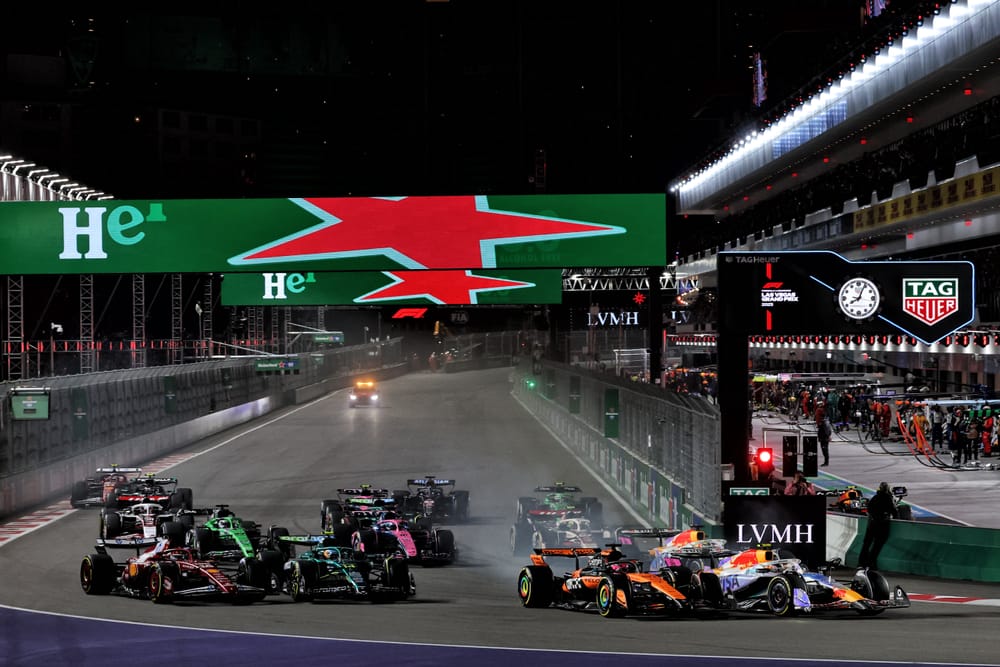While Formula 1 drivers appear unified that the current racing guidelines are not working, what is harder to find is consensus on a solution.
With drivers poised for their annual meeting with the FIA on Thursday night in Qatar to discuss the policing of racing rules, there is plenty of criticism about how things have played out during the 2025 season.
The recent penalty that Oscar Piastri was handed at the Brazilian Grand Prix for his wheel-banging moment with Kimi Antonelli (that resulted in Antonelli hitting Charles Leclerc) has exposed a disconnect between what drivers think is right and how stewards view things.
And this was further rammed home in Las Vegas when, after Liam Lawson's clash with Piastri at Turn 1 was deemed a racing incident, Piastri spoke for many when he said change was needed.
"The guidelines kind of came in place from the drivers, and I think for the large majority of incidents it's been very helpful," said Piastri last weekend.
"But clearly there's some tweaking that needs to be done, because I think [there are] potentially people gaming the rules a little bit.
"There's been a few incidents that I don't think are really what we want to see in racing."
But while drivers may accept that things are not perfect right now, what is not so clear is what kind of solution would serve as the best way forward.
Williams driver Carlos Sainz said the guidelines have become a burden for everybody - as they have been interpreted as rules, are preventing clashes being deemed racing incidents, and have caused confusion.
His perfect solution would be to get rid of the guidelines totally - but make sure that stewards' decisions are being made by on-the-ball former drivers such as those that television broadcasters have hired.
"I've seen some analysis done of quite a lot of the incidents," said Sainz.
"In some of them, Karun Chandhok, in some of them, Jolyon Palmer, some of them, I think was Anthony Davidson. And every time I see this analysis that they do and the verdict that they give from racing drivers that have been recently racing, I think they do a very good analysis.
"They put the blame correctly, most of the time, on who actually has the blame, or if it's actually just a racing incident.
"My future ideal is no guidelines and people that are able to judge these sorts of incidents, as well as these three people that I just mentioned do after the races."
But Sainz's view was not universally shared. George Russell reckoned that it is much easier for television pundits to make sensible calls when they don't have the kind of time pressures that stewards face.
"I respect those three that he [Sainz] mentioned from an analysis perspective, and I think they do get things absolutely spot on," said the Mercedes driver, when asked about Sainz's comments.
"But the benefit they have versus the stewards is they've got firstly no pressure.
"Secondly they've got time on their hands not to make a decision there in the moment.
"And thirdly they're not following guidelines. They're following their own view of their race and experience and knowledge, which, for what it's worth, I think the stewards have.
"But their job [as stewards] isn't to make a decision based upon their view and racing knowledge. Their job is to make a decision based upon the guidelines. That means the guidelines need to be correct. If the guidelines aren't correct, the decisions won't be correct."
Russell's said best way forward is for the FIA to switch to permanent stewards, so there is consistency across the season when it comes to ruling on racing incidents.
"It goes back to this point where I think consistent stewarding from individuals who've got that racing experience, who can see an incident for what it is, is where we will get the most consistent penalties for a given incident," he added.
The question that comes with the desire for permanent stewards is who would pay for them, as the costs for employing the kind of high-calibre individuals needed for the full 24-race season would not come cheap.
Ferrari driver Leclerc said he believes that what is critical going forward is making sure that common sense comes to the fore more, because the guidelines will never cover off perfectly every single incident.
"There are many, many rules, and in a sport like racing, it's very, very difficult to write black and white every single scenario that can happen," he said.
"I appreciate the fact that we are all trying to tackle as many situations as possible, but I feel like this is never ever going to be the case.
"It will rely a little bit more on the stewards feeling on certain situations...but now today we are really sticking to the book and that makes it difficult to have common sense sometimes in some specific situations."
But while there are likely to be a host of opinions thrown forward in the Qatar meeting about a better direction for F1, Russell worried the end result may well be more of the same.
"I hope we make progress," he said. "I do fear that we will end up in the same position where we make adjustments to the guidelines, and then there'll be a new incident next year that the guidelines don't really allow for.
"Then we'll see another decision based upon the guidelines and not based upon racing knowledge."



